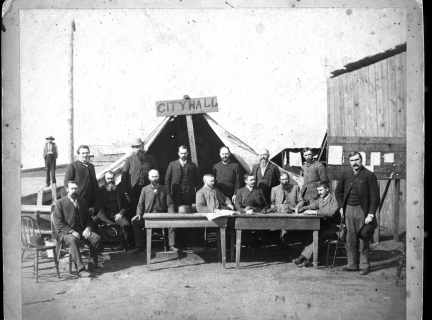Hogan's Alley

Hogan's Alley on the east side of Vancouver was part of a larger black community in Vancouver’s historic Strathcona neighbourhood. The community’s origins are believed to date from 1915-1917 when two railway stations were built nearby. Many black porters who worked on the railways ventured into Strathcona during stopovers in Vancouver. Other residents of the neighbourhood worked as janitors in downtown Vancouver. In due course, some of the black pioneers opened nightclubs and restaurants. The first black church, Fountain Chapel American Methodist Episcopal, opened in 1918.

Hogan’s Alley, bounded by Union Street to the north and Prior Street to the south and Park Lane to the west and Jackson Avenue to the east, was synonymous with Vancouver’s black community although it was only part of it.
Hogan's Alley became well-known for its distinctive culture, featuring blues musicians and chicken eateries. It was also associated with illegal gambling, drinking and prostitution. In the 1960s, the area was razed to make way for a modern development. Protesters managed to shut the project down but not before the block housing in Hogan’s Alley had been destroyed. In 1972 the Georgia Street Viaduct was built over the area.
Despite its unique and vibrant history, information on Hogan’s Alley is difficult to locate. At the Vancouver Public Library, resources can be found in Special Collections (Level 7), as well as in the main collection on other floors.
Note: Some older sources use the term “Negroes” to refer to black Canadians. This term therefore appears in the guide. It does not reflect current Canadian usage.
Secret Vancouver: Return to Hogan's Alley (Video)
Useful Websites
Digital Library Resources
Recommended Titles
Bluesprint: Black British Columbian Literature and Orature
c820.8 B658c
2001
An anthology of poems, stories, lyrics and oral recollections documenting the lives of black British Columbians from the mid-nineteenth century to the recent past. Includes oral histories of Hogan’s Alley residents originally published in Opening Doors (see below).
Hogan's Alley (video cassette)
971.1004 H71f
2004
Documents the previously unrecorded history of Vancouver's Black community between 1930 and the late 1960s. Examines the lives of three Black women: Thelma Gibson, a teacher of African-Caribbean dance, Pearl Brown, a well-known local jazz singer, and Leah Curtis, a lesbian in her mid-forties. Investigates the identities of these women, as well as the identities of a disappeared community.
My Son Jimi
781.57 H49h
1999
Rock guitar legend Jimi Hendrix had strong connections with Vancouver, where his grandparents settled around 1911. His father’s recollections provide an intimate, personal account of life in Vancouver’s black community.
Neon Eulogy: Vancouver Cafe and Street
741.67 M154n
2001
Illustrations and anecdotes chronicle the neon landmarks of Vancouver. “Vie’s Chicken and Steak House” (p. 83-85) tells the story of Viva and Robert Moore and the southern fried chicken eatery they opened in 1948.
Opening Doors in Vancouver's East End: Strathcona
971.133 O61m1
2011
An oral history of East Vancouver, including recollections of Hogan’s Alley by Peter Batistoni, Nora Hendrix, Rosa Pryor, Leona Risby, Austin Philips and Dorothy Nealy.
Performance Bond
c821 C73p
2004
A collection of poems by a black historian born and raised in Vancouver. Includes a lengthy piece about Hogan’s Alley entitled “Rune” (p. 111-156) incorporating a newspaper article, photographs of four landmarks and two transcribed interviews.
Northwest History Index
This card index in Special Collection provides access to the Northwest History Collection, a heritage collection covering the early history and exploration of British Columbia and the Pacific Northwest.
The collection includes:
- magazine and newspaper articles
- pamphlets
- books
- chapters in books
- many other resources
As of August 1998, no new material has been added to the Northwest History Index. It is continued by the British Columbia Index.


